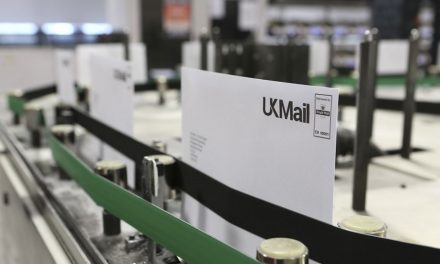
Business Post announces interim results for the six months ended 30 September 2003
http://www.business-post.com/index.asp?d=investor&h=financial.asp&s2=1&p=financial/latest-results.html&s=3
Business Post Group plc
Interim Announcement 12 November 2003
Results Presentation
Highlights
Chairman's Statement
Consolidated Profit & Loss Account
Consolidated Balance Sheet
Consolidated Cash Flow Summary
Results Presentation
PowerPoint slides of the Results presentation will be released at 11:00am.
Highlights
Business Post, the fast-growing express delivery company, announces encouraging results for the half year ended 30 September 2003 which continue to deliver progress in line with the Group's Three Year Plan.
2003 2002 Increase
Turnover (£m) 89.4 72.9 23%
Operating profit before goodwill amortisation (£m) 8.0 6.8 18%
Operating profit (£m) 7.9 6.8 16%
Pre-tax profit (£m) 8.0 7.1 13%
Earnings per share (p) 10.5 9.3 13%
Dividend per share (p) 5.95 5.60 6%
During the period, turnover of Express (the Group's business-to-business parcel service) was 7% higher at £63.0m. With service performance levels remaining high, the estimated market share again increased, to a little over 7%.
Rapid turnover growth in the Group's newer businesses (165% in HomeServe, business-to-consumer parcels, and 81% in UK Today, nationwide same day courier) continues to complement growth in the core Express business, and the Group's recent acquisitions (BXT and Weaver Pallet Express) have added further impetus.
Weaver Pallet Express, a Midlands-based express palletised goods delivery business, was acquired at the end of July and is being rebranded as UK Pallets. This provides Business Post with a strong presence in this relatively new but rapidly growing part of the express delivery sector.
Postcomm's final determination of a tariff for UK Mail's access to Royal Mail's delivery network, requested in April 2002, is expected shortly.
Peter Kane, Chairman, stated "Trading since the half year end has been encouraging, and in line with management's expectations. With Express continuing to focus on the quality of revenue, the newer businesses continuing to grow strongly and recent acquisitions trading in line with expectations, the Board expects further good progress in the current year and remains very confident about the Group's long-term potential."
Go to top
Chairman's Statement
The results for the half year ended 30 September 2003 continue to deliver progress in line with the Group's Three Year Plan. Rapid turnover growth in the Group's newer businesses (165% in HomeServe and 81% in UK Today) continues to complement growth in the core Express business, and the Group's recent acquisitions have added further impetus. Having made the majority of the planned investments during the course of last year, the first of the Three Year Plan, profits growth in the first half of this year has increased and further progress is expected in the second half.
Financial Review
Turnover increased by 23% to £89.4m (2002: £72.9m), representing like-for-like growth of 15% and further growth from the acquisitions of BXT in February and Weaver Pallet Express at the end of July.
The changing mix of business units resulted in gross profit margins of 21.1% (2002: 21.5%). Gross profit increased by 20% to £18.9m (2002: £15.7m).
Overheads increased by 24%. This principally reflected acquisitions and the full year effect of increases last year, mainly in connection with the newer and smaller businesses. After deduction of overheads, operating profit before goodwill amortisation increased by 18% to £8.0m (2002: £6.8m), and operating profit increased by 16% to £7.9m, representing an operating margin of 8.8% (2002: 9.3%).
Pre-tax profit rose by 13% to £8.0m (2002: £7.1m) and, with an effective tax rate of 30.5% (2002: 30.2%), earnings per share improved by 13% to 10.5p (2002: 9.3p).
Interest receivable reduced to £0.1m from £0.3m. Cash outflow before financing for the period was £15.6m (2002: £5.7m), primarily due to £9.7m of acquisition consideration and expenses. Capital expenditure also increased to £3.8m (2002: £2.5m) as continued investment was made in double-decked vehicles to improve operational efficiency. Net cash of £1.1m at 30 September 2002 became net debt of £13.9m, representing gearing of 29%, at 30 September 2003.
Dividend
In line with the Board's policy of progressively increasing the dividend per share whilst also increasing dividend cover, an interim dividend per share of 5.95p (2002: 5.60p), up 6.25%, has been declared. The dividend will be paid on 5 January 2004 to shareholders on the register on 12 December 2003, with an ex-dividend date of 10 December 2003.
Board
On 15 October, Business Post announced that Russell Hodgson, Group Operations Director, had been promoted to Group Managing Director, Parcel Services. In addition to his responsibility for Network Services, including Corporate and Franchise locations, Russell has assumed responsibility for the Express, International and HomeServe business units. Russell continues to report to Paul Carvell, Chief Executive, as do the Managing Directors of the Group's other business units (UK Pallets, UK Today and UK Mail).
Bringing the Group's parcel services, all of which rely on the shared infrastructure – Network Services – under Russell's leadership will bring additional focus to the Group's principal area of activities and assist the maximisation of operational leverage and cross-selling opportunities.
Business Review
Parcel Services
Express
Express is the Group's core business-to-business parcel service, and in the period represented 70% (2002: 81%) of Group turnover. It specialises in next-day deliveries for those customers who need a highly reliable service backed up by sophisticated information systems, thereby differentiating itself from the high volume/low price operators.
During the period, turnover was 7% higher than the prior year at £63.0m. With service performance levels remaining high, the estimated market share again increased, to a little over 7%.
In the preliminary announcement of 20 May, it was stated that an objective for the current year was to improve further the quality of revenue. In the period, progress was made in targeting customers which are higher users of premium services, pricing initiatives were put in place or trialled, and some less profitable business was discontinued.
International
International is responsible for all shipments coming into and leaving the UK and Eire, accounting in the period for 11% (2002: 12%) of Group turnover. A high proportion of its business derives from Business Post's activities as Global Service Participant in the UK for FedEx. Under this arrangement, Business Post is responsible for collecting and delivering parcels in those areas of the UK not served directly by FedEx. In addition to its relationship with FedEx, International handles road-based shipments within Europe, working with a number of partners across the EU.
Cross-border growth rates are considered to be roughly twice those of the domestic market and, reflecting this, International turnover was 16% higher than the prior year at £9.9m. Particularly pleasing is the progress made with International Mail, offering business customers an alternative to Royal Mail for their overseas postal requirements. First launched in July 2002, it generated revenues of £0.6m in the period.
The FedEx relationship remains strong, with the required 98% service performance level being consistently met. The new Eurodis road arrangement, providing a new delivery network across Europe, commenced trials on 1 October with a view to a full launch in January 2004, and initial signs are encouraging.
Homeserve
HomeServe, the Group's UK business-to-consumer parcel service which was launched in January 2000, provides a high quality next day service to residential addresses, with full proof of delivery and track-and-trace facilities.
During the period, turnover was 165% higher than the prior year at £6.9m, representing 8% (2002: 4%) of Group turnover. The increased turnover in part reflected the full year effect of the prior year's growth. However, important customer gains were made in the period, notably Walsh Western International (the Dublin-based logistics supplier to the high tech industry), which commenced trading in June.
This excellent performance again reflects a growing market and a targeted sales approach, concentrating on the upper end of the market (estimated to be worth some £250m p.a.) which is both suitable for caged transportation and requires a high quality delivery performance, including IT solutions.
Network Services
Network Services is responsible for providing excellent collection and delivery services to the business units within Parcel Services and employs the majority of the Group's staff.
During the period, the level of on-time deliveries remained consistently high, and unit cost increases were kept well below inflationary levels. The operation benefited from the continued introduction of double-decked trailers, which enables more parcels to be shipped in one vehicle movement, and the continued focus on improved efficiency throughout each of the network's depots.
Network Services is also starting to benefit from the roll-out of a new breed of hand-held scanner that is superior in ergonomic design, battery life and communications performance. The new scanners will improve the existing proof-of-delivery and scanning service and provide a good platform for the addition of further customer-focused capabilities.
Significant effort continues to be made to improve the levels of satisfaction experienced by both customers and staff. The first stages of improvement in the Group's customer service activities were implemented in the period, with the introduction of Discovery, new customer relationship management software, across all sites. An Employee Consultative Group was introduced from April, and employee opinion surveys were carried out in September and are currently being processed. The Group is convinced that highly motivated employees and associates deliver higher quality customer service and, in turn, higher shareholder value. This will continue to be a major area of focus.
UK Today
UK Today is the Group's nationwide same day courier service. Launched in August 2001, it operates out of both owned and franchised depots, uses separate liveried vehicles, and has access to 1,500 National Express coach movements each day linking 1,200 locations.
During the period, UK Today (excluding BXT) increased its turnover by 81% to £2.9m, which represents 3% of the Group's turnover (2002: 2%). Much of the increase resulted from the full year effect of prior year growth as UK Today expanded the number of sites from which it operated.
In the second half of the current year, UK Today will be introducing a new FastPart service which will offer storage of time-critical components linking into the network of same day locations, whilst the company will also be looking to develop national contracts to overlay on top of the existing infrastructure. There are currently few national players in the UK courier market, which is estimated to be worth some £300m p.a.
BXT, the Birmingham-based technical courier acquired in February 2003, generated turnover in the period of £2.1m, representing 2% of Group turnover (2002: nil). BXT is trading well and developing in line with expectations. Management is exploring cross-selling opportunities in each of its technical, medical and utilities sectors.
UK Pallets
UK Pallets, rebranded from Weaver Pallet Express, a Midlands-based express palletised goods delivery business, was acquired at the end of July for an initial amount of £9.0m in cash, excluding expenses, and a deferred amount of up to £3.5m comprising cash and shares in equal proportions. UK Pallets provides a nationwide express pallet delivery service through a partnership network with over 70 independent haulage businesses throughout the UK. Run from a national hub at Lichfield (Staffordshire), UK Pallets handles more than 3,000 pallets per day and is estimated to be the UK's fourth largest pallet network company. The UK pallet network market is experiencing growth of more than 30% per annum.
In the nine weeks since its acquisition, UK Pallets generated a turnover of £3.7m, representing 4% of Group turnover, and £0.1m of profit before tax. UK Pallets is developing in line with expectations and its future growth will benefit from the investment currently being made in the business under the Company's ownership.
This acquisition provides Business Post with a strong presence in this relatively new but rapidly growing part of the express delivery sector. A current market share of approximately 3% provides considerable potential.
UK Mail
UK Mail proposes to offer a business mail service in the UK under its licence from Postcomm, the independent postal industry regulator. This allows it to collect mail from business customers and undertake the initial sorting and trunking before delivery to the relevant Royal Mail delivery location, for local sorting and final delivery.
UK Mail did not trade in the period. After extensive negotiations with Royal Mail failed to reach an agreement, in April 2002 UK Mail asked Postcomm, the independent postal industry regulator, to determine a tariff for access to Royal Mail's delivery network. The proposed determination was received in May 2003 and the final determination is expected shortly. As advised in May's preliminary announcement, no contribution to profit should be assumed for the current financial year.
CURRENT TRADING AND PROSPECTS
Trading since the half year end has been encouraging, and in line with management's expectations. With Express continuing to focus on the quality of revenue, the newer businesses continuing to grow strongly and recent acquisitions trading in line with expectations, the Board expects further good progress in the current year and remains very confident about the Group's long-term potential.
Peter Kane
Chairman
12 November 2003
Go to top
Consolidated Profit & Loss Account
for the six months ended 30 September 2003
Unaudited
30 September
2003
£m Unaudited
30 September
2002
£m Audited
31 March
2003
£m
Turnover
89.4
72.9
156.3
Cost of sales (70.5) (57.2) (122.1)
——————————————————————————–
——————————————————————————–
——————————————————————————–
Gross profit 18.9 15.7 34.2
Administrative expenses (11.0) (8.9) (18.6)
——————————————————————————–
——————————————————————————–
——————————————————————————–
——————————————————————————–
Operating profit before goodwill amortisation 8.0 6.8 15.6
Goodwill amortisation (0.1) – –
——————————————————————————–
——————————————————————————–
——————————————————————————–
——————————————————————————–
Operating profit 7.9 6.8 15.6
Interest receivable 0.1 0.3 0.5
——————————————————————————–
——————————————————————————–
——————————————————————————–
Profit on ordinary activities before taxation 8.0 7.1 16.1
Taxation (2.4) (2.1) (4.9)
——————————————————————————–
——————————————————————————–
——————————————————————————–
Profit on ordinary activities after taxation 5.6 5.0 11.2
Dividends (3.1) (3.0) (9.0)
——————————————————————————–
——————————————————————————–
——————————————————————————–
Retained profit 2.5 2.0 2.2
——————————————————————————–
——————————————————————————–
——————————————————————————–
Earnings per share – basic 10.5p 9.3p 21.2p
——————————————————————————–
——————————————————————————–
——————————————————————————–
Earnings per share – diluted 10.5p 9.3p 21.2p
——————————————————————————–
——————————————————————————–
——————————————————————————–
Dividends per share 5.95p 5.60p 16.9p
——————————————————————————–
——————————————————————————–
——————————————————————————–
The profit for the financial period is derived from continuing activities and includes all recognised gains and losses for the period.
Movement in shareholders' funds
Retained profit for the period 2.5 2.0 2.2
New share capital subscribed 0.1 0.1 0.2
——————————————————————————–
——————————————————————————–
——————————————————————————–
New addition to shareholders' funds 2.6 2.1 2.4
Opening shareholders' funds 45.8 43.4 43.4
——————————————————————————–
——————————————————————————–
——————————————————————————–
Closing shareholders' funds 48.4 45.5 45.8
——————————————————————————–
——————————————————————————–
——————————————————————————–
Go to top
Consolidated Balance Sheet
at 30 September 2003
Unaudited
30 September
2003
£m Unaudited
30 September
2002
£m Audited
31 March
2003
£m
Fixed assets
Intangible assets 10.6 – 1.7
Tangible assets 33.1 30.3 30.4
Investment in own shares 0.1 0.1 0.1
——————————————————————————–
——————————————————————————–
——————————————————————————–
43.8 30.4 32.2
——————————————————————————–
——————————————————————————–
——————————————————————————–
Current assets
Loans to franchises 5.6 3.3 6.0
Trade and other debtors 35.3 27.0 28.9
Cash and cash deposits – 1.1 1.6
——————————————————————————–
——————————————————————————–
——————————————————————————–
40.9 31.4 36.5
——————————————————————————–
——————————————————————————–
——————————————————————————–
Creditors
Amounts falling due within one year
Trade and other creditors (15.6) (10.1) (13.7)
Corporation tax (2.4) (2.2) (2.2)
Dividends (3.1) (3.0) (6.0)
Term loan (1.0) – –
Bank overdraft (3.9) – –
——————————————————————————–
——————————————————————————–
——————————————————————————–
(26.0) (15.3) (21.9)
——————————————————————————–
——————————————————————————–
——————————————————————————–
Net current assets 14.9 16.1 14.6
——————————————————————————–
——————————————————————————–
——————————————————————————–
Total assets less current liabilities 58.7 46.5 46.8
Creditors
Amounts falling due after more than one year
Term loan (9.0) – –
Deferred tax (0.9) (0.7) (0.7)
Provisions for liabilities and charges (0.4) (0.3) (0.3)
——————————————————————————–
——————————————————————————–
——————————————————————————–
Net assets 48.4 45.5 45.8
——————————————————————————–
——————————————————————————–
——————————————————————————–
Capital and reserves
Called up share capital 5.3 5.3 5.3
Share premium account 10.0 9.8 9.9
Profit and loss account 33.1 30.4 30.6
——————————————————————————–
——————————————————————————–
——————————————————————————–
Equity shareholders' funds 48.4 45.5 45.8
——————————————————————————–
——————————————————————————–
——————————————————————————–
Go to top
Consolidated Cash Flow Summary
for the six months ended 30 September 2003
Unaudited
30 September
2003
£m Unaudited
30 September
2002
£m Audited
31 March
2003
£m
Operating profit
7.9
6.8
15.6
Depreciation and amortisation 1.8 1.8 3.3
Increase in working capital (3.7) (4.2) (5.2)
——————————————————————————–
——————————————————————————–
——————————————————————————–
Net cash inflow from operating activities 6.0 4.4 13.7
Returns on investment
Interest received 0.1 0.2 0.5
Tax paid (2.2) (2.1) (4.9)
Capital expenditure (3.8) (2.5) (4.1)
Equity dividends paid (6.0) (5.7) (8.6)
Acquisitions (9.7) – (1.9)
——————————————————————————–
——————————————————————————–
——————————————————————————–
Net cash outflow before financing (15.6) (5.7) (5.3)
Financing
Term loan 10.0 – –
Issue of ordinary share capital 0.1 0.1 0.2
——————————————————————————–
——————————————————————————–
——————————————————————————–
Decrease in cash (5.5) (5.6) (5.1)
——————————————————————————–
——————————————————————————–
——————————————————————————–
Analysis of net funds
Beginning of period 1.6 6.7 6.7
Decrease in cash (5.5) (5.6) (5.1)
——————————————————————————–
——————————————————————————–
——————————————————————————–
End of period (3.9) 1.1 1.6
——————————————————————————–
——————————————————————————–
——————————————————————————–
Notes
The financial information for the six months ended 30 September 2003 has been prepared using the same accounting policies as in the 31 March 2003 statutory accounts and was approved by the Board on 12 November 2003.
The financial information for the year ended 31 March 2003 does not constitute statutory accounts within the meaning of Section 240 of the Companies Act 1985. The financial information has been extracted from the statutory accounts for the year, a copy of which has been delivered to the Registrar of Companies and which carry an unqualified audit report.
The financial information for the six months ended 30 September 2003 has neither been audited nor reviewed by the auditors pursuant to APB Bulletin 1999/4.
Earnings per share have been calculated by dividing the profit for the period after taxation by 53,137,252 for the six months ended 30 September 2003, by 53,039,148 for the six months ended 30 September 2002 and by 53,048,564 for the year ended 31 March 2003, representing the weighted average number of shares issued for each period. Diluted earnings per share have been calculated by adjusting the weighted average number of shares for the effect of the exercise of share options. Adjustments of 74,977 for the six months ended 30 September 2003, 18,344 for the six month ended 30 September 2002 and 66,914 for the year ended 31 March 2003 have been made, thereby increasing the number of shares to 53,212,229, 53,103,444, and 53,048,564 respectively.
On 26 July 2003 the Group purchased Weaver (Four Oaks) Limited, trading as Weaver Pallet Express, a Midlands-based express palletised goods delivery business, for an initial consideration of £9.0m in cash plus expenses of £0.6m. Deferred consideration of up to £3.5m, comprising cash and shares in equal proportions, is payable if the adjusted profit before interest and tax for the company in the year ending 31 March 2004 reaches £2.0m. The total adjustments required to the book values of the assets and liabilities of the acquired company in order to present its net assets at fair value, in accordance with Group accounting principles, were £0.1m together with the resultant goodwill arising. From the date of acquisition to 30 September 2003, the acquisition contributed £3.7m to turnover and £0.1m to profit before tax.













